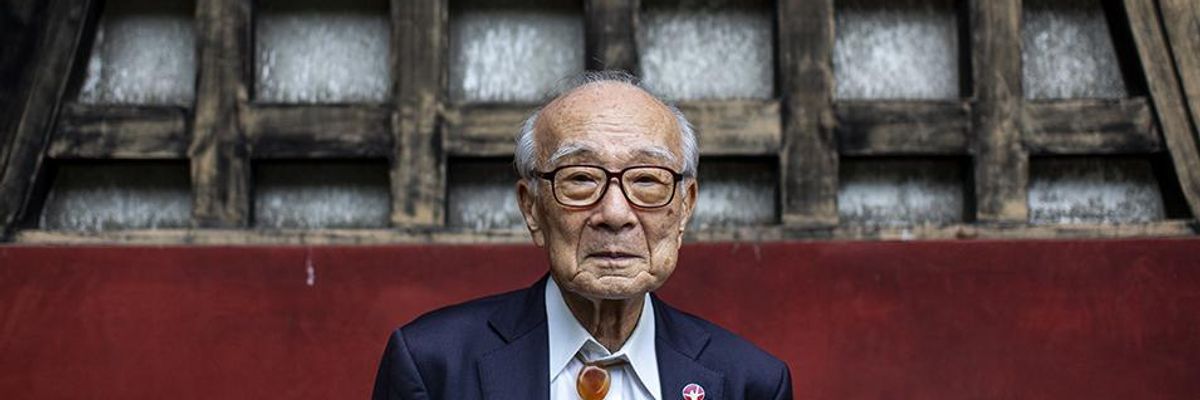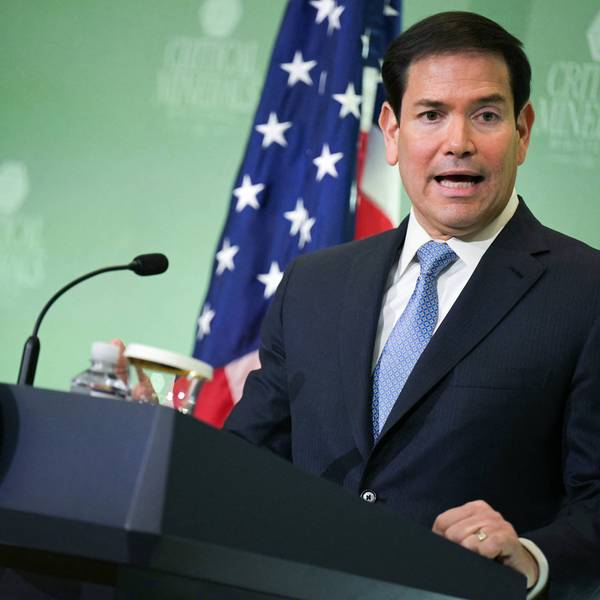
As Japan marks 75 years since the devastating attacks on Hiroshima and Nagasaki, the last generation of nuclear bomb survivors are working to ensure their message lives on after them. Terumi Tanaka, 88, was 13 when the bomb hit his hometown of Nagasaki. (Photo: Behrouz/Mehri/AFP via Getty Images)
After 75 Years, Last Survivors of Hiroshima and Nagasaki Atomic Bombings Says Nuclear Abolition Still 'Starting Point for Peace'
"Hell is probably like what we went through. It must never be allowed to happen again."
Jiro Hamasumi's mother was pregnant with him when the United States dropped a nuclear bomb on the Japanese city of Hiroshima on Aug. 6, 1945, killing tens of thousands instantly.
Today, at 74, Hamasumi is one of the remaining survivors of the attack pleading with world leaders to abolish nuclear arms.
"Hibakusha want the United States to apologize to us," Hamasumi told Agence France-Press this week. "But the proof of the apology is nuclear abolition, we're not after vengeance."
AFP estimates there are about 136,700 living survivors of the attacks on Hiroshima and Nagasaki, which ended the second World War in 1945.
For decades anti-nuclear activists have pointed to the destruction, devastation, and deadly consequences of the attacks as reason to rid the world of nuclear weapons. World leaders have continued to develop the technology, however, in spite of those pleas.
"A nuclear weapons ban is the starting point for peace."
--Lee Jong-keun, 92, Hiroshima survivor
"We must work harder to get our voices heard, not just mine but those of many other survivors," Lee Jong-keun, a 92-year-old hibakusha, who after decades of hiding his past as a Hiroshima survivor has, since 2012, joined others in telling his story and appealing for abolition of nuclear arms, said in an interview with the Associated Press this week. "A nuclear weapons ban is the starting point for peace."
In 2019, Pope Francis, speaking at Hiroshima Peace Park, a memorial to the events located in Japan, called nuclear weapons "a crime not only against the dignity of human beings but against any possible future for our common home."
"How," the pope asked, "can we speak of peace even as we build terrifying new weapons of war?"
President Donald Trump has instead forged ahead with plans for nuclear testing, even as Democratic lawmakers push for legislation that would prevent the Trump administration from restarting nuclear weapons testing.
But remaining survivors, whose numbers dwindle as they age, and activists continue their fight for a world free of nuclear weapons.
"I haven't been to Hell," Hiroshima survivor Teruko Ueno told BBC. "So I don't know what it's like, but Hell is probably like what we went through. It must never be allowed to happen again."
An Urgent Message From Our Co-Founder
Dear Common Dreams reader, The U.S. is on a fast track to authoritarianism like nothing I've ever seen. Meanwhile, corporate news outlets are utterly capitulating to Trump, twisting their coverage to avoid drawing his ire while lining up to stuff cash in his pockets. That's why I believe that Common Dreams is doing the best and most consequential reporting that we've ever done. Our small but mighty team is a progressive reporting powerhouse, covering the news every day that the corporate media never will. Our mission has always been simple: To inform. To inspire. And to ignite change for the common good. Now here's the key piece that I want all our readers to understand: None of this would be possible without your financial support. That's not just some fundraising cliche. It's the absolute and literal truth. We don't accept corporate advertising and never will. We don't have a paywall because we don't think people should be blocked from critical news based on their ability to pay. Everything we do is funded by the donations of readers like you. Will you donate now to help power the nonprofit, independent reporting of Common Dreams? Thank you for being a vital member of our community. Together, we can keep independent journalism alive when it’s needed most. - Craig Brown, Co-founder |
Jiro Hamasumi's mother was pregnant with him when the United States dropped a nuclear bomb on the Japanese city of Hiroshima on Aug. 6, 1945, killing tens of thousands instantly.
Today, at 74, Hamasumi is one of the remaining survivors of the attack pleading with world leaders to abolish nuclear arms.
"Hibakusha want the United States to apologize to us," Hamasumi told Agence France-Press this week. "But the proof of the apology is nuclear abolition, we're not after vengeance."
AFP estimates there are about 136,700 living survivors of the attacks on Hiroshima and Nagasaki, which ended the second World War in 1945.
For decades anti-nuclear activists have pointed to the destruction, devastation, and deadly consequences of the attacks as reason to rid the world of nuclear weapons. World leaders have continued to develop the technology, however, in spite of those pleas.
"A nuclear weapons ban is the starting point for peace."
--Lee Jong-keun, 92, Hiroshima survivor
"We must work harder to get our voices heard, not just mine but those of many other survivors," Lee Jong-keun, a 92-year-old hibakusha, who after decades of hiding his past as a Hiroshima survivor has, since 2012, joined others in telling his story and appealing for abolition of nuclear arms, said in an interview with the Associated Press this week. "A nuclear weapons ban is the starting point for peace."
In 2019, Pope Francis, speaking at Hiroshima Peace Park, a memorial to the events located in Japan, called nuclear weapons "a crime not only against the dignity of human beings but against any possible future for our common home."
"How," the pope asked, "can we speak of peace even as we build terrifying new weapons of war?"
President Donald Trump has instead forged ahead with plans for nuclear testing, even as Democratic lawmakers push for legislation that would prevent the Trump administration from restarting nuclear weapons testing.
But remaining survivors, whose numbers dwindle as they age, and activists continue their fight for a world free of nuclear weapons.
"I haven't been to Hell," Hiroshima survivor Teruko Ueno told BBC. "So I don't know what it's like, but Hell is probably like what we went through. It must never be allowed to happen again."
Jiro Hamasumi's mother was pregnant with him when the United States dropped a nuclear bomb on the Japanese city of Hiroshima on Aug. 6, 1945, killing tens of thousands instantly.
Today, at 74, Hamasumi is one of the remaining survivors of the attack pleading with world leaders to abolish nuclear arms.
"Hibakusha want the United States to apologize to us," Hamasumi told Agence France-Press this week. "But the proof of the apology is nuclear abolition, we're not after vengeance."
AFP estimates there are about 136,700 living survivors of the attacks on Hiroshima and Nagasaki, which ended the second World War in 1945.
For decades anti-nuclear activists have pointed to the destruction, devastation, and deadly consequences of the attacks as reason to rid the world of nuclear weapons. World leaders have continued to develop the technology, however, in spite of those pleas.
"A nuclear weapons ban is the starting point for peace."
--Lee Jong-keun, 92, Hiroshima survivor
"We must work harder to get our voices heard, not just mine but those of many other survivors," Lee Jong-keun, a 92-year-old hibakusha, who after decades of hiding his past as a Hiroshima survivor has, since 2012, joined others in telling his story and appealing for abolition of nuclear arms, said in an interview with the Associated Press this week. "A nuclear weapons ban is the starting point for peace."
In 2019, Pope Francis, speaking at Hiroshima Peace Park, a memorial to the events located in Japan, called nuclear weapons "a crime not only against the dignity of human beings but against any possible future for our common home."
"How," the pope asked, "can we speak of peace even as we build terrifying new weapons of war?"
President Donald Trump has instead forged ahead with plans for nuclear testing, even as Democratic lawmakers push for legislation that would prevent the Trump administration from restarting nuclear weapons testing.
But remaining survivors, whose numbers dwindle as they age, and activists continue their fight for a world free of nuclear weapons.
"I haven't been to Hell," Hiroshima survivor Teruko Ueno told BBC. "So I don't know what it's like, but Hell is probably like what we went through. It must never be allowed to happen again."

